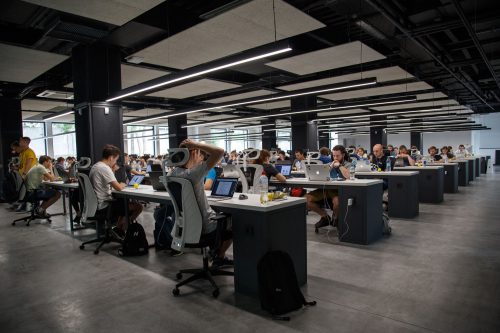
I’ve written about how the tech industry serves and reinforces negative trends in the job market. Specifically, it encourages coworking spaces for white-collar precariat workers, and it promotes a culture of endless talk and meetings. In this post, I want to move on to something a bit more everyday and immediate: the open office.
So, let’s talk about the open office.
Everyone Hates An Open Office (Except The Boss)
Aside from a few naive, shiny tech workers in their 20s, just about every worker hates the open office. To see this, we can look at the survey evidence. It shows employees in an open office plan feel worse about themselves and their jobs, and they think it makes their work more difficult. In short, it shows employees flat-out hate it.
Contrary to expectations (and company handbooks), employees interact with one another far less in the open office environment. Meanwhile, companies promote these office arrangements on the grounds that they encourage collaboration.
Oh, and senior leaders? They love the open office. For their workers, that is. They rarely want to work in that environment themselves. They have private offices with doors.
But we hardly need survey evidence to show all this. It’s obvious to almost anyone who works in that environment. Imagine working in one yourself: rows and rows of people sitting with laptops and office equipment. No dividers or private spaces to collect your thoughts. Nothing to block out noise or distraction.
It sucks, right? Right.
It Doesn’t Work (And Neither Do You)
The open office doesn’t just suck. It also doesn’t work. At least, it doesn’t work if the goal is to have more productive workers. And the research shows this, too.
People spend their time looking like they’re putting in a full effort rather than actually putting in a full effort. They collaborate less. And even business-friendly sources that tout the open office go to great lengths to mitigate its bad effects.
Lo and behold, people hate not having private space and having no way to block out distractions. By contrast, people work more effectively when they can control these things. Who would’ve guessed?
Why Do Companies Use The Open Office?
So, if the open office sucks so much, why do companies use it?
I’m sure some do it out of ignorance. They don’t know their employees hate it and it doesn’t work. But we shouldn’t let them off the hook too easily. They probably aren’t asking their employees what they want, or if they are, their employees don’t feel free to speak honestly and openly.
Most people who speculate on this question focus on issues of surveillance. When employees all sit in the open, the boss can more easily watch them. And I’m sure there’s something to this. Supervisors think their workers will goof off if they’re not being watched. For those will bullshit jobs, that’s probably even true.
However, there’s a better answer to this question. To get there, we need to return to the tech industry. That’s where the open office fad started. In order to survive, young tech companies attract venture capital. They spend a ton of time attracting venture capitalists – making VCs believe they’re busy and important. They need to show VCs they can ‘disrupt’ all those offensive middle-income jobs the VCs hate so much.
What better way to do all that than work in an open office?